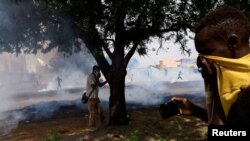Seven protesters were shot to death in Sudan on Thursday, medics said, as large crowds took to the streets despite heavy security and a communications blackout to rally against the military leadership that seized power eight months ago.
In central Khartoum, security forces fired tear gas and water cannons in the afternoon as they tried to prevent swelling numbers of protesters from marching toward the presidential palace, witnesses said.
They estimated the crowds in Khartoum and its twin cities of Omdurman and Bahri to be at least in the tens of thousands, the largest for months. In Omdurman, witnesses reported tear gas and gunfire as security forces prevented protesters from crossing into Khartoum, though some later made it across.
The protests in the capital and other cities marked the third anniversary of huge demonstrations during the uprising that overthrew long-time autocratic ruler Omar al-Bashir and led to a power-sharing arrangement between civilian groups and the military.
Last October, the military led by General Abdel-Fattah Burhan toppled the transitional government, triggering rallies demanding the army quit politics.
Some of Thursday's protesters carried banners calling for justice for those killed in previous demonstrations. Others chanted, "Burhan, Burhan, back to the barracks and hand over your companies," a reference to the military's economic holdings.
In the evening, protesters in Bahri and Khartoum said they were starting sit-ins against Thursday's deaths, one of the highest single-day tolls to date.
June 30 also marks the day Bashir took power in a coup in 1989.
"Either we get to the presidential palace and remove Burhan or we won't return home," said a 21-year-old female student protesting in Bahri.
It was the first time in months of protests that internet and phone services had been cut. After the military takeover, extended internet blackouts were imposed in an apparent effort to weaken the protest movement.
Staff at Sudan's two private sector telecoms companies, speaking on condition of anonymity, said authorities had ordered them to shut down the internet once again on Thursday.
Phone calls within Sudan were also cut, and security forces closed bridges over the Nile linking Khartoum, Omdurman and Bahri, another step typically taken on big protest days to limit the movement of marchers.
On Wednesday, medics aligned with the protest movement said security forces shot to death a child in Bahri during neighborhood protests that have been taking place daily.
Thursday's seven deaths, five in Omdurman, one in Khartoum and another child in Bahri brought the number of protesters killed since the coup to 110. There were many injuries and attempts by security forces to storm hospitals in Khartoum where the injured were being treated, the Central Committee of Sudanese Doctors said.
There was no immediate comment from Sudanese authorities.
The United Nations envoy in Sudan, Volker Perthes, called this week on authorities to abide by a pledge to protect the right of peaceful assembly.
"Violence against protesters will not be tolerated," he said.
Military leaders said they dissolved the government in October because of political paralysis, though they are yet to appoint a prime minister. International financial support agreed with the transitional government was frozen after the coup and an economic crisis has deepened.
Burhan said on Wednesday the armed forces were looking forward to the day when an elected government could take over, but this could only be done through consensus or elections, not protests.
Mediation efforts led by the United Nations and the African Union have so far yielded little progress.









